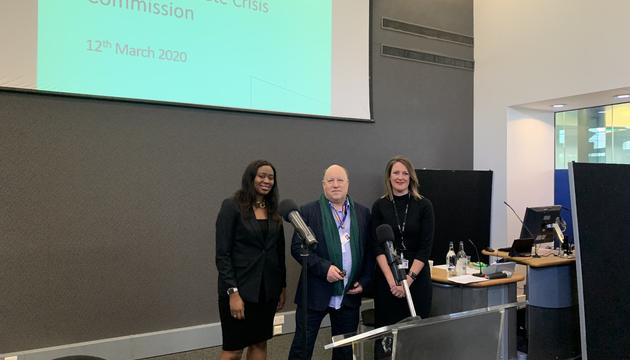
Croydon Climate Crisis Commission publishes report
3rd June 2021 - 12:22
In 2019, research by the Place-based Climate Action Network estimated that for Croydon to stay within its carbon budget it would need to deliver the majority of carbon cuts over the next ten years.
The analysis also showed that while Croydon could close the gap between its projected emissions in 2050 and a net-zero target by 61% through the adoption of options already available, more innovative options would be required to deliver the last 39%.
Croydon Climate Crisis Commission was launched in March 2020 help forge ambitious and fair action to decarbonise the local economy, under Chair Miatta Fahnbulleh, CEO of the New Economics Foundation (NEF).
Now the Commission has published a report, supported by NEF, that has delivered its recommendations. Members of working groups, members of the Croydon Citizens’ Assembly and Croydon residents and businesses all provided insights and comments to shape the recommendations.
Leadership
A central recommendation is the need for leadership by Croydon Council to establish a clear route to drive rapid reductions in carbon emissions from activities in the borough of Croydon to become carbon neutral by 2030.
The report states: “It [Croydon Council] cannot achieve the scale of change required within the necessary timeframes without the whole system working together: education, skills, and wider public sector organisations; businesses, employees, and trade unions; the community and voluntary sector; and local residents."
Fair and just pathway
In the Chair’s foreword, Miatta Fahnbulleh writes about the “sobering wake-up call” of the COVID-19 pandemic over the year since the Commission launched.
“Against this backdrop, the task of our Commission was clear: to provide practical recommendations for delivering a step change in Croydon’s transition to net zero by 2030.
“But the Commission was also clear that simply transitioning to net zero at pace is not enough. We need a pathway to a green future that is fair and just; one that creates jobs, lifts living standards, and improves our communities.”
Call to action for all of Croydon
The Commission’s report makes the urgency of the task clear and calls for bold action. But, it says, delivery is not the remit of any one part of Croydon alone.
“It must be shared and owned by all parts of Croydon’s resourceful and vibrant community from the Council to the health service, schools, colleges, local businesses, trade unions, and residents,” said Ms Fahnbulleh. “This report provides a useful first step as partners in Croydon embark on this journey together.”
The recommendations focus on five interconnected priority areas for action, with 23 associated actions:
- Achieving a scale of change (lobbying national government and GLA for regional and national action to support Croydon’s activities)
- Getting people and businesses involved (creating a positive borough-wide campaign and promoting action at scale across the borough’s stakeholders)
- Driving a green economic recovery (strengthening the local and circular economy through promoting green businesses, jobs and skills and a community wealth-building approach)
- Greening our neighbourhoods (Increasing renewable energy usage, decarbonising buildings through retrofitting, adopting the 15-minute city, and promoting public transport)
- Getting the groundwork right (developing Council strategies, an alliance of partners, and measures of oversight and accountability).
Croydon and climate change
As a large urban borough of London, Croydon has a key part to play in contributing to tackling the climate crisis. Croydon’s emissions are above the median for London boroughs. Many residents in the borough are employed in carbon-intensive industries like freight transport and civil engineering.
Simultaneously, Croydon faces climate risks such as overheating due to the urban heat island impact and flooding. The borough has a history of flooding that will likely worsen as Croydon is ranked the fourth settlement in England most susceptible to surface-water flooding. Additionally, Croydon’s expanses of green and open spaces are threatened by development and growth pressures and must be protected to enhance and conserve biodiversity.
Climate Commission concluded
Submission of the final report to the Council concludes the Commission. Recommendations on how the Council should continue to build on the momentum of the Citizen’s Assembly and Commission’s activities, and commit to deep on-going engagement with residents, community groups, workers, trade unions and businesses to ensure initiatives aimed at reducing emissions and improving quality of life in the borough are genuinely co-created are detailed in the report. This includes formalising a climate panel to review progress on the recommendations and developing an alliance of partners to drive a green recovery across the borough.
Download the report
Download the report here: The Croydon Climate Crisis Commission Report | New Economics Foundation
Image: Miatta Fahnbulleh, Chair of the Commission and CEO of the New Economics Foundation, Tony Newman, Leader of the Council, and Caireen Mitchell CEO of Croydon College, at the launch of the Croydon Climate Crisis Commission (photo: Tony Newman)




